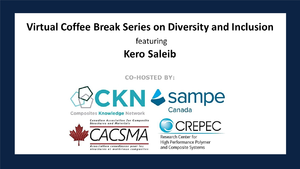D&I featuring Kero Saleib - A359
| D&I featuring Kero Saleib | |
|---|---|
| Perspectives article | |

| |
| Document Type | Article |
| Document Identifier | 359 |
|
Webinar Date
Featuring
Kero Saleib
| |
Introduction[edit | edit source]
This D&I Coffee Break session features Kero Saleib, EDI specialist and Marketing Communication expert, NGen Canada discussing 2SLGBTQIA+ and HIV inclusion in the workplace.
In this talk, Kero explores an essential question: "Are companies inclusive towards 2SLGBTQIA+ HIV-positive employees?" Through engaging discussions, concrete examples, and the perspective of the presenter, we will identify areas for improvement and strategies to ensure equal and respectful treatment for all employees.
The virtual coffee break series is presented by CKN, SAMPE Canada, CACMSA and CREPEC. Topics will include the importance of D&I, mentorship, allyship, how to make your workplace more inclusive, unconscious bias, and more.
Learning Objectives[edit | edit source]
- Understand the challenges faced by 2SLGBTQIA+ employees in the workplace.
- Analyze the inclusiveness of company policies and practices to support HIV-positive employees.
- Identify strategies and best practices for creating a more inclusive work environment for 2SLGBTQIA+ HIV-positive individuals.
Biography[edit | edit source]
Kero Saleib (they/them - he/him), is an Egyptian born Canadian, non-binary, queer, HIV positive, human with a resilience for life. They have worked for over 12 years in the HIV/AIDS sector as program coordinator and counsellor in mental health, sexual health and addictions. They are the founder of Canada's only Queer Middle Eastern party where they get to bring out their drag persona, KeroPatra InDenial. Kero now works within the manufacturing sector as Equity, Diversity, Inclusion, and Accessibility lead, bringing necessary challenges, change and policy implementation to manufacturers and helping them fill the gaps by working and hiring newcomers into the skilled labour workforce. " A Kero of all trades is a master of none but oftentimes better than a master of one."
Video[edit | edit source]
Links[edit | edit source]
- A Scoping Review of Employment and HIV
- HIV/AIDS Workplace Policy
- So You Want to Talk About Race Quotes on Goodreads
Webinar slides[edit | edit source]
Webinar slides available by clicking on the icon below
| About | Help |
Welcome
Welcome to the CKN Knowledge in Practice Centre (KPC). The KPC is a resource for learning and applying scientific knowledge to the practice of composites manufacturing. As you navigate around the KPC, refer back to the information on this right-hand pane as a resource for understanding the intricacies of composites processing and why the KPC is laid out in the way that it is. The following video explains the KPC approach:
Understanding Composites Processing
The Knowledge in Practice Centre (KPC) is centered around a structured method of thinking about composite material manufacturing. From the top down, the heirarchy consists of:
- The factory
- Factory cells and/or the factory layout
- Process steps (embodied in the factory process flow) consisting of:
The way that the material, shape, tooling & consumables and equipment (abbreviated as MSTE) interact with each other during a process step is critical to the outcome of the manufacturing step, and ultimately critical to the quality of the finished part. The interactions between MSTE during a process step can be numerous and complex, but the Knowledge in Practice Centre aims to make you aware of these interactions, understand how one parameter affects another, and understand how to analyze the problem using a systems based approach. Using this approach, the factory can then be developed with a complete understanding and control of all interactions.
Interrelationship of Function, Shape, Material & Process
Design for manufacturing is critical to ensuring the producibility of a part. Trouble arises when it is considered too late or not at all in the design process. Conversely, process design (controlling the interactions between shape, material, tooling & consumables and equipment to achieve a desired outcome) must always consider the shape and material of the part. Ashby has developed and popularized the approach linking design (function) to the choice of material and shape, which influence the process selected and vice versa, as shown below:
Within the Knowledge in Practice Centre the same methodology is applied but the process is more fully defined by also explicitly calling out the equipment and tooling & consumables. Note that in common usage, a process which consists of many steps can be arbitrarily defined by just one step, e.g. "spray-up". Though convenient, this can be misleading.
Workflows
The KPC's Practice and Case Study volumes consist of three types of workflows:
- Development - Analyzing the interactions between MSTE in the process steps to make decisions on processing parameters and understanding how the process steps and factory cells fit within the factory.
- Troubleshooting - Guiding you to possible causes of processing issues affecting either cost, rate or quality and directing you to the most appropriate development workflow to improve the process
- Optimization - An expansion on the development workflows where a larger number of options are considered to achieve the best mixture of cost, rate & quality for your application.
To use this website, you must agree to our Terms and Conditions and Privacy Policy.
By clicking "I Accept" below, you confirm that you have read, understood, and accepted our Terms and Conditions and Privacy Policy.





